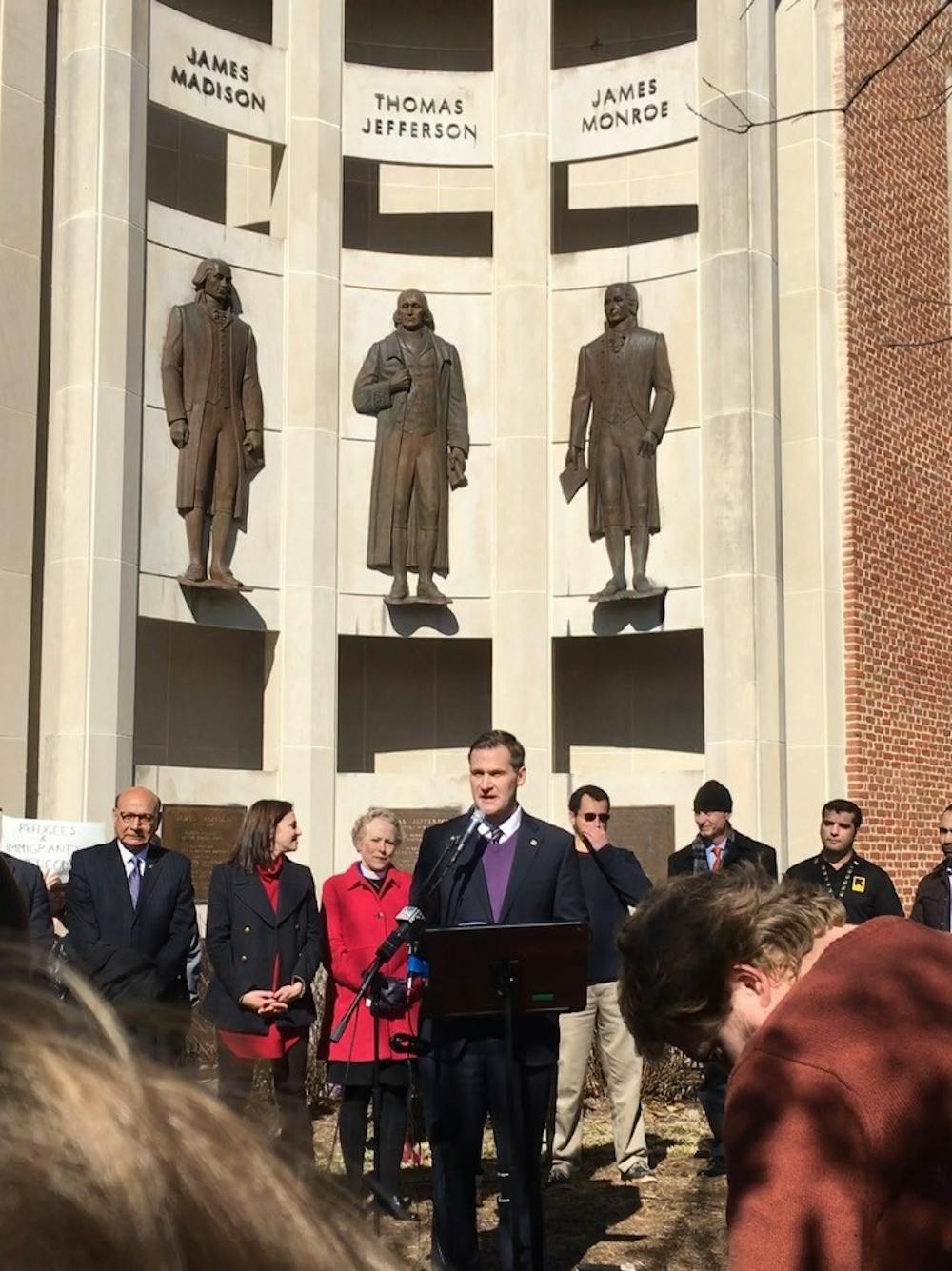Hundreds of people gathered on the Downtown Mall Tuesday for a rally in front of Charlottesville City Hall. The event, initiated by Mayor Mike Signer, was a response to President Trump’s executive order, “Protecting the Nation from Foreign Terrorist Entry into the United States.”
Signer declared Charlottesville “a capital of the resistance” against the Trump administration.
The executive order enacted last Friday halts the asylum program for refugees and prevents those who are not American citizens traveling from Iran, Iraq, Libya, Sudan, Somalia, Syria and Yemen from entering the U.S.
Signer, speaking as an individual member of City Council and not on behalf of the council as a whole, expressed his support for immigrants and refugees in Charlottesville. He announced his plans to protect the targeted members of the community, such as providing legal counsel for refugees and handling complaints of harassment.
“This weekend I spoke both with Senators Mark Warner and Tim Kaine and … they both leaped at the chance to direct their staff to provide specific casework assistance to local refugees who urgently need help and guidance,” Signer told the crowd. “I will ask the Charlottesville Human Rights Commission to discuss and address any complaints of xenophobia and religious and ethnic intolerance and harassment in our city.”
Signer addressed the legal challenges the city may face in upcoming months and his plans to engage with other local officials to determine solutions.
“All cities work with prosecutors and their local police to find an approach on immigration that best fits their local needs and I plan on asking the Charlottesville city manager to advise us on city council on all our legal options to protect immigrants and refugees,” Signer said.
Mayor Mike Signer speaking outside City Hall earlier, where he declared Charlottesville a "capital of resistance" against Trump presidency pic.twitter.com/02RfBawAXH
— The Cavalier Daily (@cavalierdaily) January 31, 2017
Several cities around the nation have considered becoming what is called a “sanctuary city,” where a locality limits the extent to which local officials cooperate with federal immigration law enforcement. One of Trump’s recent executive orders, however, has called for federal grants to be cut off such “sanctuary jurisdictions.”
Some people in Charlottesville are debating whether it too should become a sanctuary city.
Vice Mayor Wes Bellamy told The Cavalier Daily that Charlottesville cannot become a sanctuary city because Virginia is a “Dillon’s Rule” state, meaning that localities are constrained by the state legislature in what laws they can pass.
“Currently we cannot become a sanctuary city because of Virginia state law,” Bellamy said. “What we can do is see if we can rally and band with other cities in the Commonwealth to see if we can move forward in terms of changing that law. I know that’s something that we’re all very interested in, we’re going to be talking about so let’s see if we can make it happen.”
Several speakers followed Signer, including local religious leaders of various faiths and members of state government and organizations. One of the speakers was Politics Prof. and Vice Provost for Global Affairs Jeff Legro, who said the international community has positively impacted the University.
“The leaders of our University had the wisdom to recognize that we could not be a great public and a great global university unless we had humankind represented at our University,” Legro told the crowd. “So we have students, we have scholars, we have professors, we have medical residents, from all over the world.”
Legro said the ban on immigrants and refugees will directly impact the University by limiting its ability to teach international students and better itself.
“That exceptional talent from around the world cannot get here to study with us and teach us,” Legro said. “That exceptional talent from around the world cannot go out to their conferences and to their research meetings to get the work done that needs to be done. And of course, that exceptional group of scholars and faculty and students cannot see their families and that hurts them and our ability to fulfill our mission.”
Khizr Khan, father of late Army Capt. and University graduate Humayun Khan, also spoke at the event.
Khan spoke to the power of solidarity and his hope for the future. In an interview with The Cavalier Daily, he said he thought the event went well and encouraged nationwide support for immigrants and refugees.
“Communities are standing up because they know that that is the only way to move forward in the American spirit — to keep faith in our values of pluralism, freedom of religion, freedom of speech,” Khan said.
Khizr Khan also spoke at the rally, tells crowd, "we continue to speak against ... this dark chapter that is being written in our country." pic.twitter.com/3k6dJVS1nO
— The Cavalier Daily (@cavalierdaily) January 31, 2017
Khan said moving forward, the community should remain aware of events taking place and take heart in the national efforts.
“The community should feel strong because this is happening throughout the country and throughout the world so we are not alone. Charlottesville is not alone,” Khan said. “This community should remain heartened. The community should keep an eye on what is taking place and speak, whenever there is a time, speak, speak louder.”
Signer said he sees Charlottesville as a beacon of tolerance and he would like to see Charlottesville as a leader in resistance.
“We have a very particular history on religious toleration, we have a very particular history on the development of constitutional values,” Signer said in an interview with The Cavalier Daily. “I think we should step up and I think we’re the right community to step up.”







